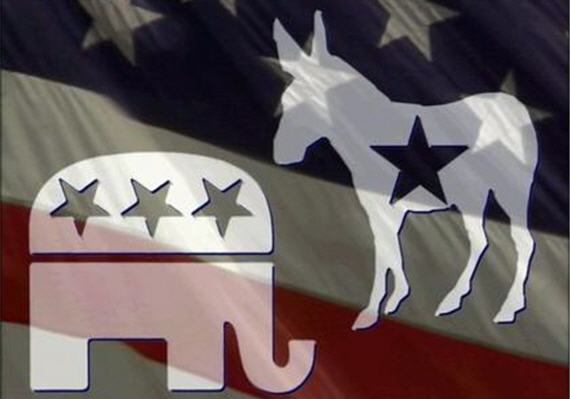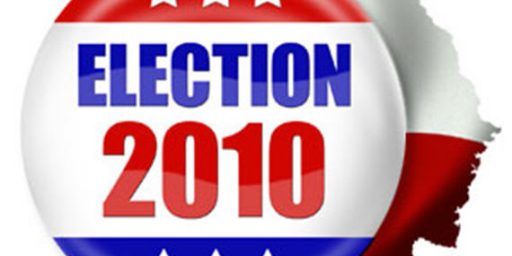All Republicans are RINOs (and all Democrats are DINOs).
Party labels are just names, as such all Republicans are Republicans in name only.
 Steve Bainbridge asks: So what if Mike Castle is a RINO? Specifically he address what he calls “The holier than thou crowd on the right” who want to defeat Mike Castle as the GOP nominee to compete for the Delaware Senate that was recently held by Joe Biden.
Steve Bainbridge asks: So what if Mike Castle is a RINO? Specifically he address what he calls “The holier than thou crowd on the right” who want to defeat Mike Castle as the GOP nominee to compete for the Delaware Senate that was recently held by Joe Biden.
First, Steve is correct in his basic argument that Castle’s primary opponent, the Tea Party endorsed Christian O’Donnell would basically guarantee a Democratic hold on the seat. He further notes
The US is a center-right country, with at most maybe 35% ideological conservatives, and a lot of them want the government to keep its hands off their Medicare! By letting the perfect be the enemy of the good, Riehl and his ilk are ensuring themselves of a pure minority. I guess it makes for good talk radio and blog posts, but it’s a lousy electoral strategy.
Indeed.
Second, and more importantly, I want to take this opportunity to discuss the term “RINO” (i.e., Republican in Name Only) and suggest that it is actually a redundancy. Specifically, all Republicans (and Democrats and Libertarians, etc.) are only Republicans because they choose to use the label “Republican” to describe themselves.
Hence: Senator Richard Shelby is a Republican because he had a press conference saying that he was no longer a Democrat and likewise Arlen Specter is a Democrat and not a Republican because, well, he said so.
You can do the same with any number of figures over time, including, off the top of my head, Phil Gramm and Ben Nighthorse Campbell as well as former Alabama Governor Fob James. Other recent examples include Charlie Crist and Joe Lieberman.
On one level the label only tells us 1) what party nominated the candidate in the first place via the primary process, and 2) what party’s caucus the individual will affiliate with once in Congress, which matters in terms of voting for leadership as well as things such as determining the ratio of Republicans to Democrats on committees.
Certainly as a shorthand for voters as well as for an organizing principle for the internal structures of the legislature, party label is quite important—in many ways moreso for the latter than the former.
Indeed, Steve’s basic point in terms of electoral strategy is quite sound: if Republicans want to actually control Senate leadership, then they almost certainly need Castle to win the GOP nomination in Delaware, as he is the only Republican in the race with the high likelihood of a November victory.
Beyond all of that, there is a difference between the precise policy preferences of a given candidate and their party label. This should be quite obvious. This is true is terms of broad categories like how liberal or conservative they may be, as well as their specific stances on specific issues.
I can fully understand why someone who is particularly conservative, or conservative in a particular way might not like Castle and would prefer O’Donnell in that race. Still, that fact does make Castle any less a Republican than O’Donnell. Indeed, since Castle has held numerous offices as a Republican and O’Donnell has not, Castle has a better claim to the label at this moment in time than does O’Donnell.
I will say this: if a person is elected to Congress as a Republican and then caucuses with the Democrats and votes for Democratic leadership and still claims the label Republican, then I would say that the RINO label would be fair.






In your purely analytical world, you are correct. As far as your assessment of Castle vs. O’Donnell and their relative success at defeating a dem, there may be a whole lot more emotion in play this cycle which could skew the probability curve. If independents decide elections and if they are angry at the dems and their choice of Obama in 2008, they may just vote for a Tea Party candidate out of spite. I would hope they take the election more seriously, but if their state of being in this bad economy distorts their view of sanity, then, who knows?
It’s all a matter of what degree a politician is a RINO or DINO. In Castle’s case it appears he has strayed too far off the ranch for many and has made O’Donnell a more reasonable choice even with her baggage.
RINO can still be an accurate term for the liberal Republicans even if they still caucus with the right people. It’s their actual votes that matter.
@Pete: even so, I am not sure how that alters my basic analysis.
@Steve:
But do the votes in question determine their “Republican-ness” or something else (i.e., ideology, specific policy preferences)? Indeed, what you are saying is that there is a key subjective measure of Republican-ness which is linked to a particular version of conservatism. In other words, you are trying to make the party label mean a specific ideological stance and while the parties have both become more ideological in recent years, that still doesn’t mean that there is a 1:1 correlation between Republican and a specific version of conservatism.
Indeed, RINO tends to mean to a given Republican voters “a Republican that I don’t like.”
I think that the discussion of RINOs and DINOs as well as much of the sturm und drang in contemporary politics is the attempts of minorities within each part at transforming their parties from the catch-alls they’ve alway been into programmatic parties.
This is creating major problems in governance for both parties. I think that the really, truly progressives and the really truly conservatives account for about an eighth of the electorate each despite their influence within the parties, particularly at the national level. Cf. here.
That means that, if the progressives within the Democratic Party are satisfied, most other Americans won’t be, and, if conservatives within the Republican Party are satisfied, most other Americans won’t be. Not a good formula for governance.
At a time like this, scorching irony, not convincing argument, is needed.
Frederick Douglass
How do we measure America as a center-right country? It can’t be relative to ourselves, right? That would make no sense. Our moderates must be, by definition, our moderates.
I think the way they do it is poll US voters against similar groups, mainly in Europe. I’m sure our center is right of their center, no question.
But that doesn’t mean that our right, relative to our center, becomes our center. Illogical, Captain.
“Pew Poll Notes Rise In Independent Voters”
http://www.npr.org/templates/story/story.php?storyId=104406480
A sign that our center might be our center.
Well, one could do it by comparing it to other countries or to a defined left-right spectrum.
Right, but as I say, that can’t be used as an argument against our center, or even our left. I’m sure our left is right of the European left on a variety of issues.